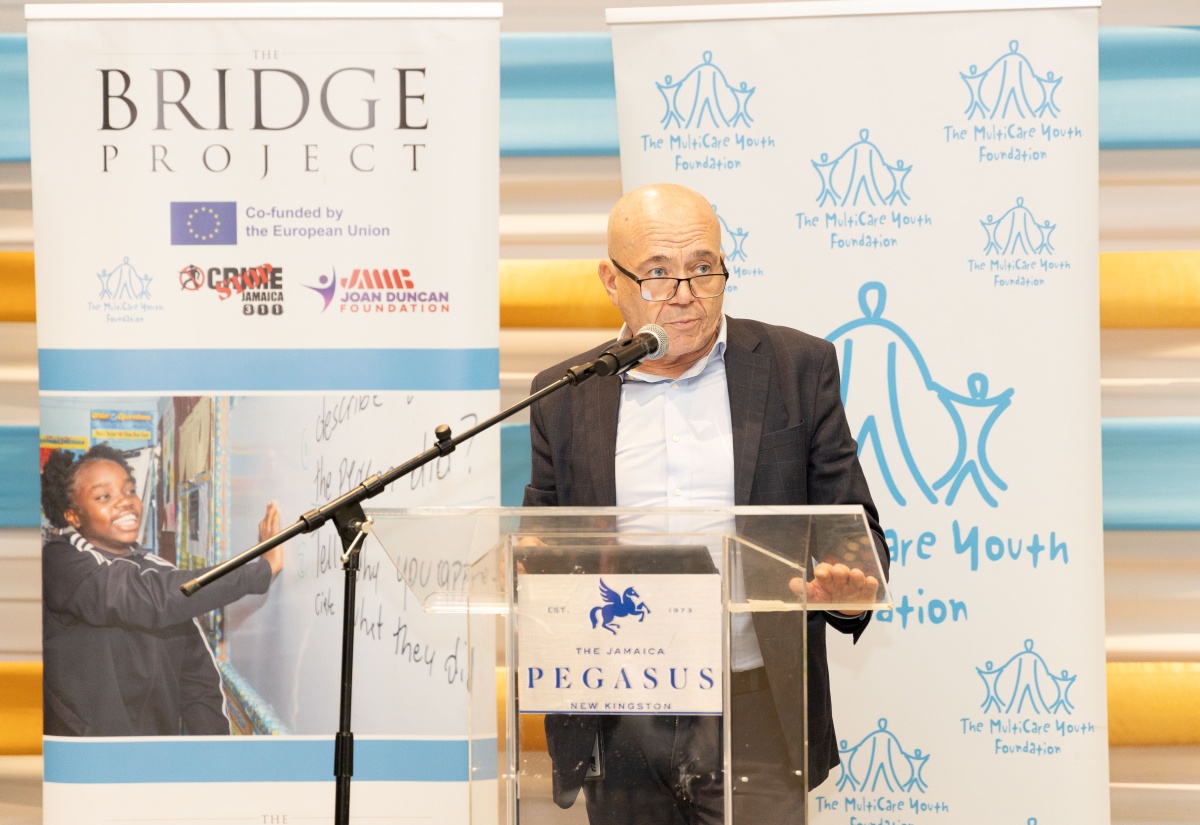EU Reaffirms Commitment to Work With Young People and Communities
By: , October 14, 2025The Full Story
The European Union (EU) has reaffirmed its commitment to working alongside communities and young people in Jamaica, as the EU-sponsored BRIDGE Project has concluded, following 34 months of impactful work across the island.
Head of Cooperation for the EU Delegation to Jamaica, Aniceto Rodriguez Ruiz, said the initiative represented more than a development project, describing it as a shared investment in the potential of Jamaica’s youth.
He reaffirmed that the European Union remains steadfast in its partnership with Jamaica, particularly in initiatives that empower young people and promote safer communities.
“The European Union remains committed to working alongside communities and young people, to help create a future where education, opportunity, and safety are accessible to all,” Mr. Ruiz emphasised.
He was speaking at the project’s graduation and closing-out ceremony, held recently at The Jamaica Pegasus hotel in New Kingston.
“It is a privilege to be here on behalf of the European Union to mark the closing of the BRIDGE Project after 34 months of work with communities across Jamaica. This project has been about creating opportunities and supporting young people, many from challenging backgrounds, to take steps towards a better future,” he said.
Mr. Ruiz noted that the BRIDGE (Building through Reintegration, Intervention, Development, Growth, and Education) Project has been an important component of the EU’s long-standing partnership with Jamaica, particularly in advancing citizen security and social development.
“The EU has been in Jamaica for many years, supporting citizen security by involving civil society organisations in the national effort to prevent crime and violence. Through these joint efforts, it helps create the foundation for a safer, more sustainable, and prosperous future for all,” he said.
Addressing the close to 60 attending graduates from a cohort of more than 300, Mr. Ruiz lauded their resilience and commitment to succeed, despite the obstacles they encountered.
“To the young people present in the room, we celebrate not only the certifications you are receiving but also, and above all, the efforts you have made to invest in yourselves, your skills, and your communities,” he said.
“For many of you, this might be a first-time experience, attending a graduation, and it shows your strength and determination in the face of real challenges,” Mr. Ruiz added.
He explained that the BRIDGE Project was designed to create pathways for reintegration, personal growth, education, and employment.
Through partnerships with the MultiCare Youth Foundation (MYF) and Crime Stop Jamaica, he said the initiative reached youth in communities that often face barriers to opportunity.
“The progress you have made, whether at school, in behaviour, or in acquiring skills for the job market, will have positive effects beyond just yourselves. It will impact your families, your neighbours, and your communities for the time to come,” Mr. Ruiz said.
“Your achievements matter. The values you have learned – respect, perseverance, and hope – are important tools that you carry with you as you move ahead. The skills, arts, mentorship, and other support offered through this project are just a few ways we hope you can express and build your confidence,” he continued.
Mr. Ruiz extended appreciation to the wide network of stakeholders who supported the project.
“I also want to acknowledge and thank all of the many partners who have made this possible. To public-sector institutions such as the Ministries of National Security and Peace and Education, Youth, Skills and Information; private organisations; civil society groups; mentors; facilitators; service providers, and each individual who has contributed to this effort, your commitment has been essential,” he said.
The BRIDGE Project, funded by the European Union and implemented by the MultiCare Youth Foundation, was executed over three years and targeted at-risk youth in five communities across Kingston and St. Andrew, Clarendon, Westmoreland, and St. James. The programme provided literacy support, mentorship, employability training, counselling, and behavioural therapy, aimed at fostering personal and community resilience.




